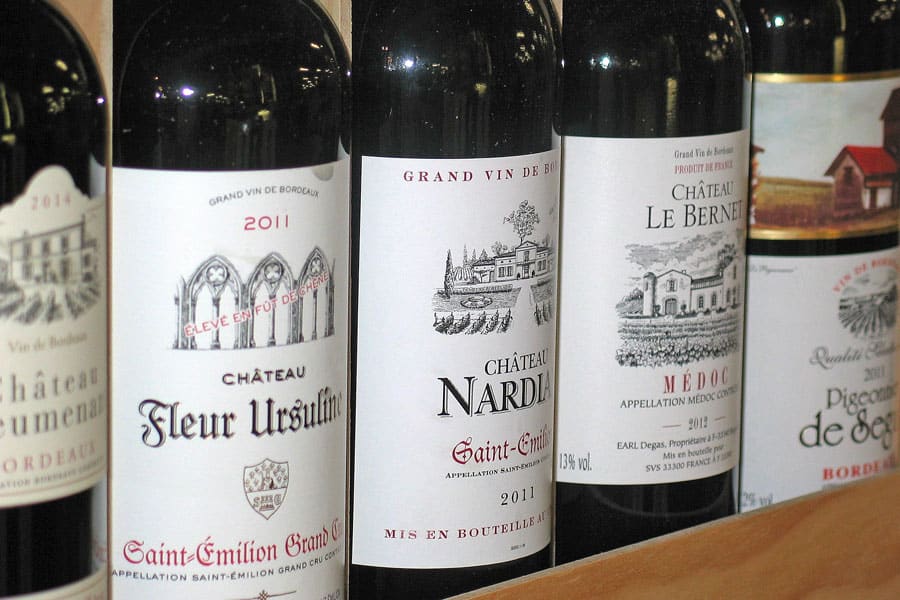For more than two years, the exportation of French wines in the United States have been record-breaking. While the quality of French viticulture products and their renown explain this success, another element participates actively to the shining success of these French wines on the American market: oenological translation! How can this allow you to confront the recently implemented American customs surtaxes?
The success of French wines in the USA has proven out
Globally, the sales of French wines and spirits has continued to improve in 2019. They have confirmed their place as the second larges commercial sector, behind aeronautics, but ahead of cosmetics and luxury goods.
Did you know? The success of French luxury exports is more than just a legend. While the French luxury industry is outstripped by their wines on the global scale, it remains one of the most flourishing sectors, seeing an augmentation of 6.3% in exports in 2018.
Exportation of French wines: a worldwide success in 2019
La Fédération des Exportateurs de Vins et Spiritueux de France (FEVS – The French Federation of Wine and Spirits Exporters) released the numbers for 2019, and the numbers speak for themselves.
The exports of French wines and spirits have increased by 5.9% for a total, record turnover of 14 billion euros.
- 4.7 billion euros for spirits, an increase of 8.8%. The volume exported remained stable with 53 million cases.
- 9.3 billion euros for wines, which represents a 4.4% growth and 139 million cases exported.
Burgandy wines took the number one slot in terms of volume (+ 8.1%) as well as turnover (+ 10%). Bordeaux wines shrunk 4.4% in total volume, but the turnover remained the same when compared to 2018.
As for spirits, cognac was the biggest winner, seeing an increase in the volume of bottles sold at 6.6% for a total value of 3.4 billion euros (+ 11.5%).
What should we know about the sales of French wines in the United States?
On the American market, French viticulture products have, once more, been a complete success in 2019.
In terms of turnover, the USA is the largest importer of French wines: last year, they purchase 1 of every 5 bottles exported in the world (compared to 1 of every 8 in the United Kingdom). The revenue of exported French wines and spirits has grown by 16%, i.e. a turnover of 3.7 billion euros, and in increase in sales of 5.5%.
For example, in regards to spirits, Americans purchased nearly half of all French cognac, in volume and value.
Regardless of the state (Massachusetts, Washington, etc.) or the city (New York, Seattle, etc.), Americans seek out viticulture products from Europe, but above all, from France. Most imported wined are French. They’ve completely conquered the American market.
But, these positive results hide a darker reality: they were boosted in anticipation of an increase in American customs fees on the importation of certain European products, including French wines and spirits.
Behind these positive results, hides a darker reality:
The sales of these French wines were boosted in anticipation of an increase in American customs fees on the importation of certain European products, including French wines and spirits.
American customs surtaxes: a future limitation for the exportation of French wines?
The American response to subsidies illegally paid to Airbus by Europeans states was to impose a 25% customs duty on imported agricultural and industrial products coming from the European Union. The total amount of these subsidies came to 7.5 billion euros. The WTO condemned the practice, judging it to be unfair competition for the American competitor, Boeing, and authorised Donald Trump’s government to add a surtax to various European products. The objective is to recuperate the 7.5 billion dollars.
Losses already on the books
This new turn of affairs has already shown major consequences of the export of French wines to the US.
- Entering into law on 18 October 2019, the increase in American taxes led to a drop of 17.5% in the export of French non-sparkling bottled wines in the last quarter of 2019. That comes to a loss of 40 million euros of revenue.
- In November 2019, the exportation of French wines to the United States dropped 44% over the numbers in October. This number should be taken with a grain of salt, as it may reflect the desire of importers to stock-up ahead of the implementation of the tax.
Which wines are subject to the American surtaxes?
Customs surtaxes in the United States only concern the following European viticulture products:
- French and Spanish still wines (non-sparkling) with alcohol content equal to or less that 14% abv and packaging inferior to 2 litres. Italian wines are exempt.
- German, Italian, British, and Irish spirits. French cognac is not surtaxed.
For the American president, these customs sanctions are all the more justified as the taxes applied by France (and other European countries) on Californian wines is so high.
NB: according to the United States International Trade Commission, to this point, the tax on the importation of European wine to the US was between 5.3 to 12.7 cents per 75cl bottle, depending on the nature and alcohol content of the product. American wined imported to Europe are subjected to 11 to 29 cents per bottle according to the Wine Institute, which represent the interests of the wine sector in the United States.
The FEVS isn’t hiding its worry about the increase of customs fees in the sector on the American market.
The exceptional results in 2019 demonstrate the interest Americans have in French wines. But with these customs surtaxes, the future is uncertain. French producers and exporters must therefore bet on the value brought to their wines through effective, well-structured communication for the American market. The challenge: continue to attract clients despite the increase in price.
At the heart of a communication and promotional campaign for the US market: oenological translation becomes an essential tool.
Oenological translation: an essential tool for exporting French wines
In order to export French wines to the United States, and the rest of the world, it is crucial you call on professional translation services. But beware you don’t entrust the translation to a translator with no experience in viticulture!
Every variety of wine has its own characteristics. Oenological translation must highlight the numerous nuances of these French products. The terminology will differ whether you are presenting a rosé, a grand crus like Château Mouton Rothschild, a Cabernet Sauvignon or un pinot noir! This sector requires the expertise of professional, experience translators in oenology.
Calling on a translation agency specialised in oenology is the key to present the subtleties of French wines to aficionados in your target countries and to ensure the success of your exportation:
- The team of translators is sensibilised in the tastes of wines from across the world to be able to better discern the specificities of French wines. The team is composed of experts in oenology, who learned the correct terminology specific to the viticulture sector through on-the-ground experience. The techniques of viticulture and vinification are second nature to them. They have pointed experience in the material used, the wine-making practices, the production process, and the final product. They’ve mastered the art of the translation and localisation of source texts, whatever their level of technicity.
- These translators, specialised in oenology, are linguists who have mastered all the subtleties of the target language, because it is their native tongue. They are able to bring out the subtle nuances of the various varieties, such as the notes and tones, in order to recreate aromas and history of each terroir. They actively participate in highlighting these French wines and spirits in international markets.
While French wines took a big hit in the American market, exporters still have a few cards left to play to promote the exceptional French varieties and terroirs within the USA and the rest of the world. Oenological translation, carried out be an agency specialised in the domain, is a key that makes all the difference on the international stage and accompanies the success of French wines in exported markets.







